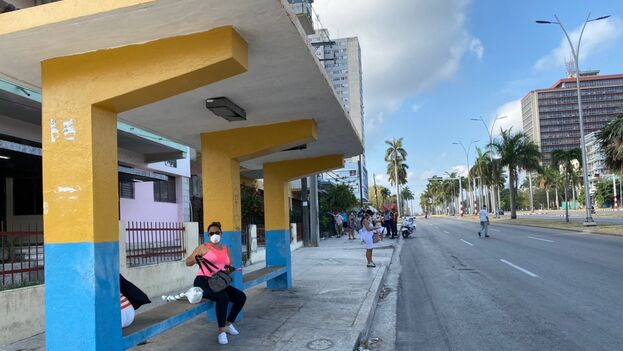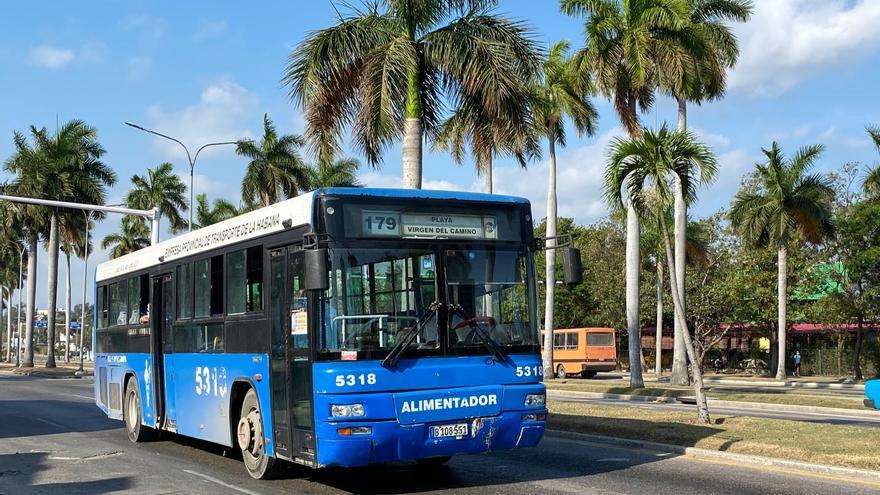
![]() 14ymedio, Luz Escobar, Havana | 14 April 2020 — It is nine o’clock in the morning and the nurse, in her impeccable white uniform, has been waiting since half-past six for transport to take her to work at the hospital.
14ymedio, Luz Escobar, Havana | 14 April 2020 — It is nine o’clock in the morning and the nurse, in her impeccable white uniform, has been waiting since half-past six for transport to take her to work at the hospital.
“This is awful today. I’m at this stop trying to get to the hospital, but nothing,” she says as she waits on Boyeros Avenue. Despite being one of the people whose travel is prioritized, there is no doubt that today she will be late for work.
“The thing is, nothing was coordinated on Sunday and this Monday we did not know how to get around. I hope this improves,” she says. In a few minutes she sees an ambulance and beckons to it in the hope that it will stop and take her to her destination, or at least leave her close, but the vehicle goes in another direction and drives off without being able to carry her.
Last Thursday, the authorities announced the closure of urban public transport to curb the spread of the coronavirus, which is already spreading through community transmission in Cuba. The Minister of Transportation, Eduardo Rodríguez Dávila, indicated that only workers from prioritized activities could access the vehicles through an identification mechanism, but on the first day it did not work well.
Some, like Luis Cañizares, who was waiting a few yards from the nurse, seemed to have misunderstood the measure. “I live with my mother, but I take care of my aunt who is very ill and lives alone in Playa. From here it is impossible to go direct so I must get to El Vedado first, but nothing has happened. On television they warned us about it but never I thought it was so general,” this resident of Plaza de la Revolución tells 14ymedio. “What happens is that she needs me because she is very old and sick and cannot go out shopping,” he insists.
After waiting almost three hours, the nurse manages to get on a bus from the Transmetro line that serves a hospital and stops to pick her up. Although Cañizares tries to convince the driver he has good reason to travel, the driver explains that he is only allowed to pick up the identified medical personnel.
“Then they talk about solidarity, but it wouldn’t cost him anything to take me. The bus was empty, there were only about five people. I don’t understand why they paralyze everything like this, there are people who need to move and Havana is a big city,” he protests.

In addition to urban and intercity transport, both public and private, the authorities have also suspended the extra capacity provided by state vehicles at the stops that it regulated since last September, where they were ordered to contribute to carrying bus passengers in the context of crisis that the Government defined as a “temporary situation.”
The Transport Minister noted this Monday in the state-run newspaper Granma that the measures do not affect private vehicles, which can continue to circulate for “the essential and without overcrowding.” In addition, he explained that services related to mobility, such as racing and management of passengers at taxi stops, are also suspended. “The suspension has been carried out ex officio, so that the workers do not need to carry out any formalities,” he clarified.
At the Cerro y Boyeros stop, one of the busiest in the capital, there was also calm. Only about five people waited under the concrete roof, avoiding catching the sun rays that were already heating the asphalt. “We have been here for two hours and nothing. I cannot stay at home, I must go see my husband in the Cardiology Institute where he is admitted, and here I am with my son who accompanies me but neither a private car nor a bus has passed, nothing at all, we are desperate now,” says Carmen, a 67-year-old from Havana.
Mayra, 43, a teacher, also waits at the bus stop, hidden under a tree, fanning herself while waiting for a miracle. “I think I’m already walking, I’ve been at this stop for two hours waiting for something to get me out of here and it’s just for fun.”
Although the schools closed, Mayra must stand guard at her teaching center, but the transportation that should be guaranteed does not pass. “I wpon’t head out for guard duty any more if they don’t come and get me at my house,” she says annoyed, as she walks off in the sun.
In the Fajardo hospital the machinery is still greased to move health personnel every day. “They have put on three buses and three fixed-route taxis for us but the itineraries are still being adjusted,” an employee of the health center, who preferred anonymity, tells this newspaper.
The Transport Minister has already warned that “accommodations” will be made daily to avoid that the essential activities that must be carried out every day are harmed. There is no other option if they want to avoid having doctors arrive hours late to hospitals. And in the midst of a pandemic.
________________
COLLABORATE WITH OUR WORK: The 14ymedio team is committed to practicing serious journalism that reflects Cuba’s reality in all its depth. Thank you for joining us on this long journey. We invite you to continue supporting us by becoming a member of 14ymedio now. Together we can continue transforming journalism in Cuba.
